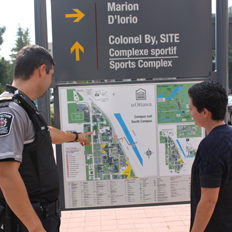Our mission is to enhance security, develop alternative modes of transportation, ensure respect for the rights of the university community and protect the assets of the University and its community.

Protection Services
Our mandate
Our vision and values
Protection Services aims to be a leader in matters of security, prevention, management of transportation requests and parking, by providing forward-looking, innovative services in both official languages; to become recognized, in its pursuit of excellence, for its expertise and skills development, for its proactive and client-friendly service approach through respect for all members of the community and through transparency and openness in its relations with each and every community member.
Explore

Parking and sustainable transportation
Volunteer Crisis Response Team (VCRT)

Sexual violence: support and prevention

Emergency procedures
Reliable service available 24 hours a day, 7 days a week
At the heart of Canada’s capital, the University of Ottawa is one of our country’s leading research universities. The University of Ottawa is a cosmopolitan community of over 40,000 students, faculty and staff who live, work and study in both English and French. Our campuses are like a small city, teeming with life. Protection Services has been serving its community since 1969 and takes pride in ensuring a quality of life to its clientele and making our campuses safe. Protection Services is available 24 hours a day, 7 days a week, all year round. To find out where our offices are located, click on the links below:
Location of Protection Services office on main campus (downtown location)
141 Louis-Pasteur
At Roger-Guindon, the Protection Services office is located near the main entrance, in room 2013.
At 200 Lees, the Protection Services office is located in room C-146.
We are often asked if our campuses are safe. At Protection Services, we believe that they are very safe. With 40,000 people on our campuses, they are home to a small community. If all the members of this community make an effort to reduce risk by taking simple preventative measures, the risk of becoming a victim is reduced. The most common crime on campus is theft of personal property. Trends show that thieves take advantage of situations such as a wallet or laptop left unattended or a bike or locker with a poor quality lock. Would you like to learn how to reduce the risk of becoming a victim of theft or other crimes on campus? Browse the pages of this Web site to get tips on how to prevent crime and to learn about the services available to help make our campuses even safer.
Security guards’ skills
University of Ottawa’s Protection Services security guards work in a very dynamic environment. A wide variety of calls await them each day. This is why professional development and continuing education are so very important for security guards. Here is an example of some of the certificates, diplomas and titles our guards hold:
- College diploma in Law and Security, Police Foundations, Security Management Baccalaureate
- First aid, CPR, Automated External Defibrillator (AED), and Oxygen
- Powers of Arrest, Use of Force, Handcuffing and Expandable Baton
- Self-Defence tactics
- Sexual Harassment
- Workplace violence awareness
- CPTED (Crime Prevention Through Environmental Design)
- Can Bike 2
- Crisis and Conflict Management
- Verbal Judo - Tactical Communications
- Smart Serve
- Diversity and Profiling
- Incident Management System (IMS) training
Protection Services’ teams have decades of experience in emergency response and personal safety.
Authority of our security guards and investigative team
Property owned by the University of Ottawa is considered private property. Therefore, by authority of section 494 of the Criminal Code, security guards have the authority to make an arrest if they witness a person committing a criminal offence on University of Ottawa property. They can also give notice to a person that he or she is trespassing. This notice, which can be in writing or oral, would restrict the individual in question from coming onto University of Ottawa property or to specific areas of the campus (residences, for example).
To assure that only authorized individuals are permitted on University of Ottawa property, for example where access may be restricted (i.e. science laboratories), security guards may ask for your identification in acccordance with the Interim Directive on the Interpretation and Application of University of Ottawa Policy 33 - Security Section 8 (Requests for Identifying Information). Should you refuse to identify yourself, you may be given immediate notice that you are trespassing and be requested to leave the area immediately. Should you refuse to do so, this may lead to your arrest by authority of the Trespass to Property Act.
We work closely with University faculties and departments. We are committed to maintaining public order on our campuses and ensuring the safety of all. Our agents and our investigative team work with deans and police services to ensure that an individual who is guilty of a wrongful act faces the consequences of his or her actions. For example, a student who commits an act of vandalism in a residence and is identified through a subsequent investigation must reimburse the University for the damage he or she caused. For other criminal acts, charges may be dealt with by the courts.
Contact us
Protection Services
141 Louis-Pasteur
Ottawa, ON, Canada K1N 6N5
Tel. : 613-562-5499
E-mail – Inquiries: [email protected] (this e-mail address is not for emergencies)
Report an emergency
Tel. : 613-562-5411



